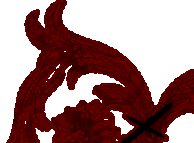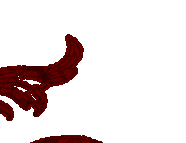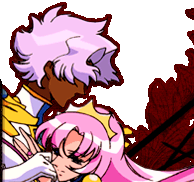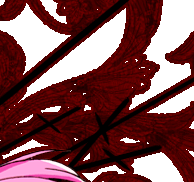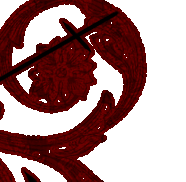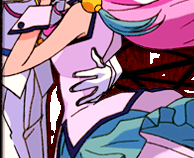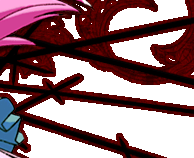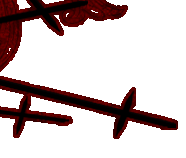
This analysis was donated by Kiseki. I will preface by saying that I could be wrong beyond my comprehension.
Feel free to e-mail me at jtkim83@earthlink.net if you have any comments,
questions, or objections to some of the things that I am going to say in
this essay.
In any case, having studied philosophy enough, the lyrics of the second half
of the song 'Virtual Star Embryology' struck me as very Aristotelian. More
specifically, the second half of the song seemed to go through Aristotle's
conception of the cosmos. In hopes of showing my point, I will go through
the relevant part of the song (from 'Soshite Tsukiten Suseiten...' ('And
Lunar Heaven, Mercurial Heaven...') to 'Hitotsu no Eikyuu Undou Souchi'
('One perpetual motion device')) and point out Aristotle's view on the
cosmos along the way.
Soshite Tsukiten Suseiten Kinseiten
Taiyouten Kaseiten Mokuseiten
Doseiten Kouseiten Gendouten
And Lunar Heaven, Mercurial Heaven, Venusian Heaven
Solar Heaven, Martian Heaven, Jovian Heaven
Saturnian Heaven, Sidereal Heaven, Motive Heaven
These lines seem to list the planets in order from the least distant from
the Earth to the most distant. In Aristotle's cosmos, the Earth was at the
center of the universe and, as far as I know, was stationary and did not
move. This means that everything else in the cosmos was moving, since it is
an obvious phenomenon that planetary bodies and stars appear to be moving to
us.
In any case, for Aristotle, the moon (referenced by 'Lunar Heaven') was the
closest to Earth, followed by Mercury ('Mercurial Heaven'), Venus ('Venusian
Heaven'), the Sun ('Solar Heaven'), Mars ('Martian Heaven'), Jupiter
('Jovian Heaven'), and Saturn ('Saturnian Heaven'). Each of the bodies
rotated in their own orbits, although in the Ptolemaic system, which was the
system that lasted until Johannes Kepler proved that the Copernican picture
was the true picture, the planets orbited around a point that revolved in a
circle around the Earth. It must be noted that Uranus, Neptune, and Pluto,
however, were not even known to have existed during Aristotle's lifetime.
Beyond Saturn, for Aristotle, lied the immovable stars ('Sidereal Heaven').
However, the stars did not move on their own. Since they were seen to be
moving from Earth, and since the Earth was stationary, something was moving
the immovable stars. For Aristotle, this was ultimately the Prime Mover
('Motive Heaven'). The Prime Mover had structured the universe to make the
cosmos that it was in accordance with the good. In a sense, the cosmos was
a reflection of the Prime Mover itself.
Saranaru Enkan Mugen ni Hatenaki
Further circular infinity without end This line seems to refer to the nature of Aristotle's cosmos. Since the
Prime Mover created the cosmos as a reflection of himself, the cosmos was
eternal. However, there was one problem: the Prime Mover was immaterial
and completely outside the sequence of time, which meant that he could exist
as is throughout the entirety of time. However, the cosmos was within the
sequence of time, and nothing could remain in its original state and be
eternal within time. So, in order to make the cosmos eternal, the Prime
Mover made the cosmos eternal in change. So, the Prime Mover set the
planets and stars in orbit so that they would be eternal in the change, in
this case, of motion and movement. Hitotsu no Yuukitekina Kikan
Hitotsu no Eikyuu Undou Souchi
One organic system
One perpetual motion device In terms of the line, 'one organic system', Aristotle actually believed the
planets to be living objects. In the American Heritage Dictionary, one of
the definitions of 'organic' is 'of or derived from living organisms', so
the interpretation fits. The line 'one perpetual motion device' refers
again to the eternity of the cosmos through motion (by orbiting around the
Earth).
Well, the Aristotelian analysis of the lyrics is all fine and good, but the
main question is the point of the analysis. Well, 'Virtual Star Embryology'
is played as Saionji's duel song in the Akio Arc.
As we all know, Saionji wants Anthy, the Rose Bride. Throughout the series,
Saionji has always wanted Anthy. However, the reasons behind his desire of
Anthy are not obvious.
Saionji, as all Revolutionary Girl Utena fans should know, is friends with Touga. However, Touga
always seems to have dominance over Saionji. Touga's the President of the
Student Council, while Saionji is only the Vice President. Touga always
beats Saionji while practicing kendo together. Indeed, Touga has always
been the dominant one of the two, while Saionji was always the passive one.
When they were all children, Touga was the one that went to Utena while
Saionji stayed behind in the church graveyard.
In a situation like this, the most obvious thing one would want would be a
means to exert superiority. In fact, this is probably what Saionji desires:
to exert superiority over Touga, and thus, everyone. Saionji wants to be
eternal and create and set in motion the entire cosmos - just like the Prime
Mover does. However, Saionji needs the Rose Bride to achieve this goal.
However, 'Virtual Star Embryology' is not just Saionji's duel song in the
Akio arc. It is also the ending song played during the Akio and Apocalypse
arcs, and it is the duel song that starts off the Akio arc, since Saionji is
the first one to duel Utena in the Akio arc. As such, the lyrics probably
refer at least to those parts of the series in general - which heavily
involve Akio.
Obviously, Akio is in the position of the Prime Mover and has created the
planets (the duelists) and set them in motion. For a very long time, Akio
has used the dueling to maintain his hold on Anthy, who is the power behind
the duels, and thus maintain the eternity of the cosmos he has created for
himself. The batch of duelists in Shoujo Kakumei Utena is no different from
the rest.
Yet, I have to reflect on the last lines:
Aa Kuudou Nari
Sowa, Kuudou Nari Nari
Ah, it is an empty movement.
That is an empty movement. It is.
The lines run contrary to the Aristotelian system in that there is a purpose
to the movement of the cosmos. Indeed, in the entirety of Aristotle's
philosophy, there is a purpose to every single thing in the cosmos.
Ultimately, the lines may end up serving as a sort of irony/sarcasm in that
it is negating the movements set about by the Prime Mover (Saionji and Akio)
as purposeless. The lines may ultimately imply that the system that Saionji
wants will never be achieved and that the system constructed by Akio will
eventually fail. However, this is a mere guess, and I presently do not have
any evidence to back my claim up.
As for the first half of the lyrics, this is also a guess, but it may
involve elements of pre-Aristotelian philosophy. The word, 'atoms', shows
up in the lyrics of 'Virtual Star Embryology'. Aristotle did not believe in
atoms at all, but there was a Greek that came before Aristotle that did:
Democritus. I believe the word, 'air', in the lyrics may be a reference to
a Greek that believed that air was the primal element from which everything
was created. Again, though, these are mere guesses, and I have absolutely
no evidence to support the claims.
Nonetheless, much of the song involves references to ancient Greek
philosophy that, if understood, help to elaborate on the story and the
characters within Shoujo Kakumei Utena. Indeed, at least some of the other
duel songs (such as the duels involving Juri, Shiori, Kozue, and Akio) serve
a similar purpose, which only demonstrates the brilliance of J.A. Seazer.
This also makes Shoujo Kakumei Utena an anime that requires a very open
mind. So, listen to all of the duel songs carefully and try to make
connections with the lyrics and the story. Most important of all, have fun
watching it. It's Utena, for God's sake.
 |

